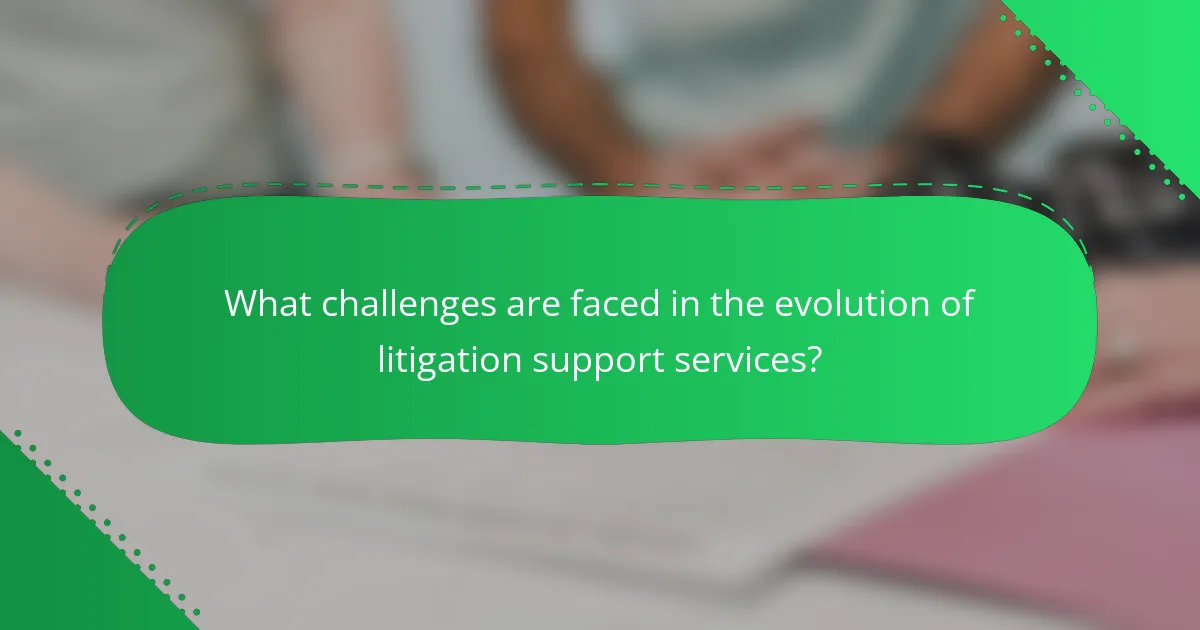The article focuses on the future of case analysis within litigation support services, highlighting current trends and innovations that are shaping the industry. Key advancements include the integration of artificial intelligence and automation, which enhance document review and e-discovery processes. The rise of cloud-based solutions facilitates collaboration and accessibility, while data analytics allows legal professionals to evaluate case strengths and weaknesses effectively. Additionally, the article addresses challenges such as the rapid technological evolution, data security concerns, and the need for continuous training in the legal field. Overall, these developments reflect a significant shift towards efficiency and adaptability in litigation support services.

What are the current trends in litigation support services?
Current trends in litigation support services include increased use of artificial intelligence and automation. These technologies streamline document review and e-discovery processes. Cloud-based solutions are gaining popularity for their accessibility and collaboration features. Data analytics is being utilized to assess case strengths and weaknesses. Cybersecurity measures are becoming essential due to rising data breaches. Remote depositions are now common, enabling flexibility in legal proceedings. Additionally, there is a growing emphasis on integrating litigation support with case management systems. These trends reflect the industry’s shift towards efficiency and adaptability.
How are technology advancements shaping litigation support services?
Technology advancements are significantly shaping litigation support services by enhancing efficiency and accuracy. Tools such as artificial intelligence streamline document review processes. AI can analyze vast amounts of data quickly, identifying relevant information faster than human reviewers. This reduces the time and cost associated with litigation. Furthermore, cloud-based platforms facilitate real-time collaboration among legal teams. These platforms allow for secure access to case files from anywhere, improving communication and workflow. Additionally, advanced analytics tools provide insights into case trends and outcomes. This data-driven approach helps legal professionals make informed decisions. Overall, technology is transforming litigation support into a more efficient and effective process.
What role does artificial intelligence play in case analysis?
Artificial intelligence enhances case analysis by automating data processing and improving decision-making. AI algorithms can quickly analyze large volumes of legal documents, identifying relevant information and patterns. This capability reduces the time lawyers spend on manual reviews. Additionally, AI tools can predict case outcomes based on historical data. Research indicates that AI can increase efficiency in case analysis by up to 70%. AI-driven insights assist legal teams in formulating strategies and preparing for trial. Overall, AI plays a transformative role in modernizing case analysis practices.
How do data analytics enhance litigation strategies?
Data analytics enhance litigation strategies by providing insights from large volumes of case data. They allow legal teams to identify patterns and trends in previous cases. This analysis can reveal the strengths and weaknesses of arguments. It also aids in predicting outcomes based on historical data. For example, predictive analytics can forecast the likelihood of success in specific jurisdictions. Furthermore, data analytics streamline the discovery process by quickly sorting through documents. This efficiency reduces time and costs associated with litigation. Studies show that firms using data analytics have improved win rates significantly.
What are the emerging methodologies in case analysis?
Emerging methodologies in case analysis include data analytics, predictive modeling, and collaborative case management. Data analytics utilizes large datasets to uncover patterns that inform case strategies. Predictive modeling employs algorithms to forecast case outcomes based on historical data. Collaborative case management enhances communication among legal teams using digital platforms. These methodologies improve efficiency and decision-making in litigation. Research indicates that firms adopting these approaches see a 30% increase in case resolution speed. A study by the American Bar Association highlights the growing importance of technology in legal practices.
How is predictive coding transforming document review?
Predictive coding is transforming document review by automating the process of identifying relevant documents. This technology uses algorithms and machine learning to analyze large datasets. It significantly reduces the time and cost associated with traditional manual reviews. Studies show that predictive coding can improve accuracy by up to 95% in identifying pertinent information. Legal teams can prioritize documents based on relevance, enhancing efficiency. The integration of predictive coding allows for faster case resolutions. As a result, firms can allocate resources more effectively. This shift represents a major advancement in litigation support services.
What is the impact of cloud-based solutions on case management?
Cloud-based solutions significantly enhance case management efficiency and accessibility. These solutions allow real-time collaboration among legal teams, regardless of location. They streamline document sharing and storage, reducing the risk of data loss. Security features in cloud solutions protect sensitive case information effectively. According to a study by the American Bar Association, 27% of lawyers reported improved productivity after adopting cloud-based tools. Additionally, cloud solutions often provide scalable resources, accommodating the needs of growing legal practices. This flexibility enables firms to adapt quickly to changing case demands. Overall, cloud-based solutions represent a transformative shift in case management practices.

How are innovations influencing the future of case analysis?
Innovations are significantly influencing the future of case analysis by enhancing efficiency and accuracy. Advanced technologies, such as artificial intelligence and machine learning, streamline data processing. These tools can analyze vast amounts of information quickly, identifying patterns that human analysts might miss. Predictive analytics is also emerging, allowing legal professionals to forecast case outcomes based on historical data. Furthermore, cloud-based platforms facilitate collaboration among legal teams, enabling real-time access to case materials. This shift towards digital solutions reduces manual errors and accelerates the decision-making process. The integration of these innovations is reshaping how legal cases are analyzed and managed.
What new tools are being developed for litigation support?
New tools for litigation support include advanced e-discovery platforms, AI-driven legal research tools, and case management software. E-discovery platforms streamline document review and data analysis. AI-driven tools enhance legal research efficiency by providing relevant case law and insights. Case management software integrates various aspects of litigation, improving collaboration among legal teams. These innovations aim to reduce costs and improve case outcomes. Recent developments focus on incorporating machine learning for predictive analytics, enabling better case strategy formulation. Additionally, cloud-based solutions are gaining traction for their accessibility and security features. These advancements reflect ongoing trends in legal technology aimed at enhancing litigation support services.
How does e-discovery software improve efficiency?
E-discovery software improves efficiency by automating the process of collecting, reviewing, and managing electronic data. This automation reduces the time required for manual document review. It streamlines workflows by organizing large volumes of data systematically. Advanced search functionalities allow users to quickly locate relevant information. The software also enhances collaboration among legal teams by providing shared access to documents. Additionally, e-discovery tools often include analytics features that identify patterns and key insights. According to a study by the RAND Corporation, e-discovery can reduce costs by up to 75% compared to traditional methods. These efficiencies lead to faster case resolutions and improved overall productivity.
What features should modern litigation tools include?
Modern litigation tools should include advanced document management capabilities. This feature allows for efficient organization and retrieval of legal documents. Integration with e-discovery tools is essential for identifying relevant information quickly. Collaboration features enable multiple users to work on cases simultaneously. Analytics capabilities help in assessing case strengths and weaknesses. User-friendly interfaces enhance accessibility for legal professionals. Security measures must protect sensitive client information. Mobile compatibility allows access to tools on-the-go. These features collectively improve the efficiency and effectiveness of litigation processes.
Why is collaboration becoming essential in case analysis?
Collaboration is becoming essential in case analysis due to the complexity of modern legal cases. Legal matters often involve multiple stakeholders with diverse expertise. Collaborative efforts enhance the quality of analysis by integrating various perspectives. This approach leads to more comprehensive understanding and better decision-making. Research shows that teams working collaboratively produce higher-quality outcomes. A study by the American Bar Association indicates that collaborative case analysis improves efficiency and reduces errors. As cases grow more intricate, collaboration is key to navigating challenges effectively.
How do virtual teams enhance case outcomes?
Virtual teams enhance case outcomes by improving collaboration and leveraging diverse expertise. They allow team members from different geographical locations to contribute their knowledge. This diversity leads to more comprehensive case analysis. Virtual teams can quickly adapt to changing circumstances and share real-time information. Enhanced communication tools facilitate immediate feedback and decision-making. Studies show that teams utilizing virtual collaboration tools report higher satisfaction and productivity. For example, a report by McKinsey found that productivity improves by 20-25% in teams that effectively use digital collaboration tools.
What platforms facilitate better communication among legal teams?
Collaboration platforms facilitate better communication among legal teams. Tools like Microsoft Teams, Slack, and Zoom enhance real-time communication. These platforms support document sharing and task management. Legal teams benefit from integrated features like video conferencing and chat. For instance, Microsoft Teams allows seamless collaboration on documents via SharePoint. Slack’s channels organize discussions by topics or cases. Zoom provides secure video meetings for sensitive conversations. Research shows that effective communication tools improve team efficiency by 25%.

What challenges are faced in the evolution of litigation support services?
Litigation support services face several challenges in their evolution. One major challenge is the rapid advancement of technology. This includes the need to integrate artificial intelligence and machine learning into existing systems. Another challenge is the increasing volume of data that legal professionals must manage. This data explosion complicates document review and analysis processes. Additionally, there are concerns regarding data security and privacy. Legal firms must ensure compliance with regulations while handling sensitive information. Another significant challenge is the need for continuous training. Legal professionals must stay updated on new tools and methodologies. Lastly, the cost of implementing advanced litigation support technologies can be prohibitive for some firms. These challenges hinder the efficient evolution of litigation support services.
How do legal professionals adapt to rapid technological changes?
Legal professionals adapt to rapid technological changes by embracing new tools and methodologies. They invest in training to enhance their digital skills. Many firms implement advanced case management software to streamline processes. This software often features AI capabilities for document review and analysis. Legal professionals also utilize cloud-based platforms for secure data storage and collaboration. Continuous learning through workshops and online courses is common. Networking with tech experts helps them stay informed about innovations. According to a 2021 ABA survey, 70% of lawyers reported using technology to improve efficiency. This demonstrates a commitment to integrating technology in legal practices.
What skills are necessary for lawyers to thrive in a tech-driven environment?
Lawyers must possess several key skills to thrive in a tech-driven environment. First, they need strong digital literacy to navigate various legal technologies. This includes understanding e-discovery tools and case management software. Second, analytical skills are essential for interpreting data and using it effectively in cases. Lawyers should also be adept at cybersecurity practices to protect sensitive client information. Communication skills are crucial for collaborating with tech teams and clients. Additionally, adaptability is important as technology evolves rapidly. Continuous learning is necessary to stay updated on legal tech trends. Research skills are vital for leveraging online databases and resources efficiently. These skills collectively enhance a lawyer’s effectiveness in a tech-centric legal landscape.
How can firms overcome resistance to adopting new technologies?
Firms can overcome resistance to adopting new technologies by implementing effective change management strategies. These strategies include clear communication about the benefits of the new technology. Educating employees on how the technology improves their work processes is crucial. Engaging employees in the decision-making process fosters a sense of ownership. Providing training and ongoing support helps alleviate fears and build confidence. Demonstrating quick wins can showcase the technology’s value early on. Research indicates that organizations with strong change management practices are 6 times more likely to achieve project success (Prosci, 2021).
What ethical considerations arise with innovations in case analysis?
Ethical considerations in innovations in case analysis include data privacy, informed consent, and bias. Data privacy concerns arise when handling sensitive information. Innovations may involve advanced technologies that require stringent data protection measures. Informed consent is crucial when using new analytical methods that may impact clients. Clients must understand how their data will be used and the implications of these innovations. Bias can emerge from algorithms or analytical tools that may favor certain outcomes. This can affect the integrity of case analysis and lead to unjust results. Ensuring fairness and transparency in these innovations is essential for maintaining ethical standards in litigation support services.
How do privacy concerns affect the use of case data?
Privacy concerns significantly limit the use of case data. Organizations must comply with regulations like GDPR and HIPAA. These laws restrict how personal data can be collected, stored, and shared. As a result, legal teams face challenges in accessing comprehensive case data. This limitation can hinder evidence gathering and analysis. Additionally, privacy concerns may lead to increased data anonymization. Anonymization can reduce the richness of data insights. Consequently, the effectiveness of case analysis may be compromised. Legal professionals must navigate these complexities to ensure compliance while maximizing data utility.
What standards should be established for data handling in litigation?
Standards for data handling in litigation should prioritize integrity, confidentiality, and accessibility. Data must be collected and preserved in a manner that maintains its authenticity. Chain of custody protocols must be established to track data from collection to presentation in court. Access to sensitive data should be restricted to authorized personnel only. Regular audits should ensure compliance with established protocols. Data should be formatted and organized for easy retrieval and review. Compliance with legal and regulatory standards, such as the Federal Rules of Civil Procedure, is essential. These standards help ensure that data handling practices support fair and just legal proceedings.
What best practices can improve case analysis in litigation support?
Implementing structured methodologies enhances case analysis in litigation support. Utilizing frameworks like Issue Spotting aids in identifying key legal issues. Consistent documentation of findings improves clarity and accessibility. Collaboration among team members fosters diverse insights and solutions. Leveraging technology, such as data analytics, increases efficiency and accuracy. Regular training ensures that staff stay updated on best practices. Utilizing case management software streamlines organization and retrieval of information. These practices collectively lead to more effective case analysis outcomes.
How can legal teams effectively integrate new technologies?
Legal teams can effectively integrate new technologies by conducting thorough needs assessments. They should identify specific areas where technology can enhance efficiency and accuracy. Training staff on new tools is essential for successful adoption. Regular feedback loops can help refine technology use and address challenges. Collaborating with IT specialists ensures proper implementation and support. Monitoring performance metrics can gauge the impact of technology on workflows. Research shows that firms utilizing legal tech see a 30% increase in productivity.
What strategies ensure successful collaboration in case analysis?
Successful collaboration in case analysis relies on clear communication, defined roles, and structured processes. Clear communication fosters understanding among team members. It ensures that everyone is on the same page regarding objectives and expectations. Defined roles help to eliminate confusion about responsibilities. Each team member should know their specific tasks and how they contribute to the overall analysis. Structured processes, such as regular check-ins and updates, facilitate timely progress tracking. These processes also allow for addressing any emerging issues promptly. Research by the Project Management Institute shows that effective communication can improve project success rates by up to 20%. Therefore, implementing these strategies enhances collaboration and leads to more effective case analysis outcomes.
The main entity of the article is litigation support services, with a focus on the future of case analysis through trends and innovations. The article outlines current trends such as the integration of artificial intelligence, automation, and cloud-based solutions that enhance efficiency in document review and e-discovery. It discusses the role of data analytics and predictive coding in improving case strategies and outcomes, as well as the importance of collaboration among legal teams. Additionally, the article addresses challenges faced in adapting to technological advancements and highlights best practices for effective integration of new tools in litigation support.



